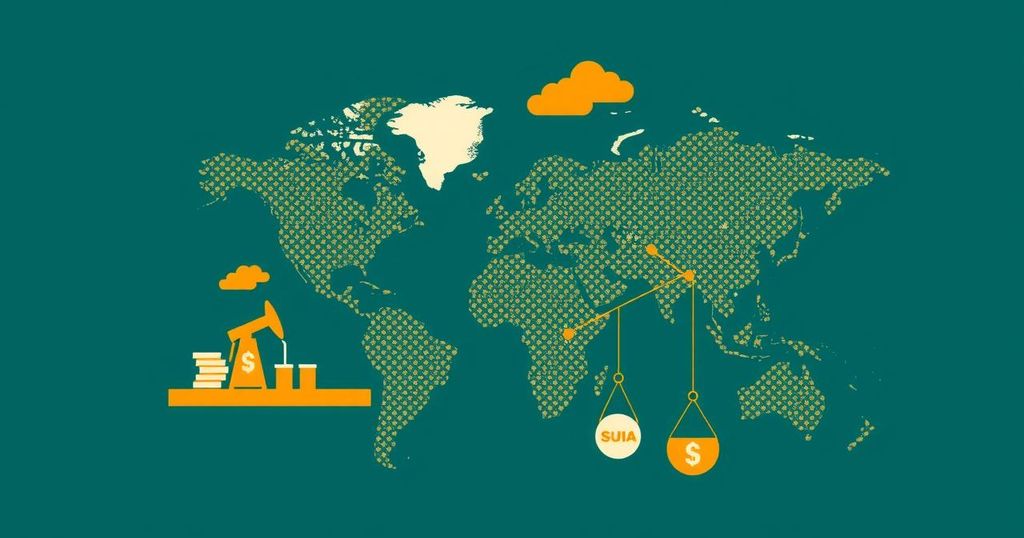Taxing Major Oil Companies Could Surge UN Climate Fund by Over 2000%
A small tax on major oil companies could increase the UN climate fund by over 2000%, addressing costs from extreme weather linked to climate change. The analysis from Greenpeace International and Stamp Out Poverty advocates for a sustainable tax framework, which could yield substantial revenue for climate initiatives.
A recent analysis jointly conducted by Greenpeace International and Stamp Out Poverty has revealed that a modest tax imposed on seven of the world’s largest oil and gas companies could amplify the United Nations Fund for Responding to Loss and Damage by over 2000%. This initiative aims to address the financial burdens imposed by extreme weather events linked to climate change. The organizations advocate for a sustainable tax framework targeting fossil fuel extraction, including annual increases and excess profits taxation. For instance, taxation on ExxonMobil’s 2023 extraction could fund nearly half the expenditures related to Hurricane Beryl, while revenues from Shell could substantially cover the damages from Typhoon Carina. Taxing TotalEnergies could yield more than thirty times the anticipated expenses of the floods in Kenya in 2024. David Hillman, Director of Stamp Out Poverty, stated, “While oil and gas giants keep raking in grotesque levels of profit from exploiting resources, the damages resulting from the industry’s operations are disproportionately borne by people who did not cause the crisis.” He emphasized that a Climate Damages Tax would hold polluters accountable for their climate impacts, aiding affected communities in transition to sustainable practices. The financial repercussions stemming from severe weather events attributed to climate change have raised alarming concerns. An estimated total of USD 64.6 billion has been linked to such catastrophic occurrences this year alone. As the analysis indicates, implementing a Climate Damages Tax starting at USD 5 per tonne of CO₂-equivalent could potentially raise hundreds of billions of dollars by 2030, benefiting vulnerable populations facing climate adversity. The proposed tax structure, if enacted across affluent OECD nations, could play a pivotal role in bolstering climate action funding. By incrementally increasing the levy, forecasts suggest as much as USD 900 billion could be raised by 2030 to aid governments worldwide in their responses to looming climate challenges. Abdoulaye Diallo, Co-Head of Greenpeace International’s Stop Drilling Start Paying campaign, remarked, “Who should pay? This is fundamentally an issue of climate justice and it is time to shift the financial burden for the climate crisis from its victims to the polluters behind it.” With this analysis, the urgent need for effective financial mechanisms such as a Climate Damages Tax has been underscored, alongside calls for international governments to implement fiscal strategies that alleviate the environmental injustices induced by fossil fuel industries. Recent protests organized by Greenpeace demonstrate a growing public demand for accountability among major oil companies, reflecting a wider community’s call for action on climate injustices.
The proposed Climate Damages Tax (CDT) aims to hold some of the world’s largest oil and gas corporations accountable for their significant contributions to climate change. Following the announcement of the Loss and Damage Fund at COP27 in Egypt, concerns over extreme weather and its financial impact have intensified. Various natural disasters, exacerbated by climate change, have resulted in overwhelming socio-economic consequences, placing the burden on those least responsible for climate change. The CDT presents a viable approach for financing climate action and provides a mechanism for recourse for affected nations and communities struggling with climate impacts.
In summary, taxing major oil and gas companies could drastically enhance the UN Fund for Responding to Loss and Damage, potentially raising substantial funds for addressing climate-related economic hardships. Such taxation strategies not only promote accountability among industrial polluters but also highlight a necessary shift towards funding climate initiatives that prioritize vulnerable populations. The call for measures like the Climate Damages Tax signifies a critical step toward advancing climate justice and ensuring that those responsible for environmental degradation contribute to mitigation efforts.
Original Source: www.webwire.com




Post Comment